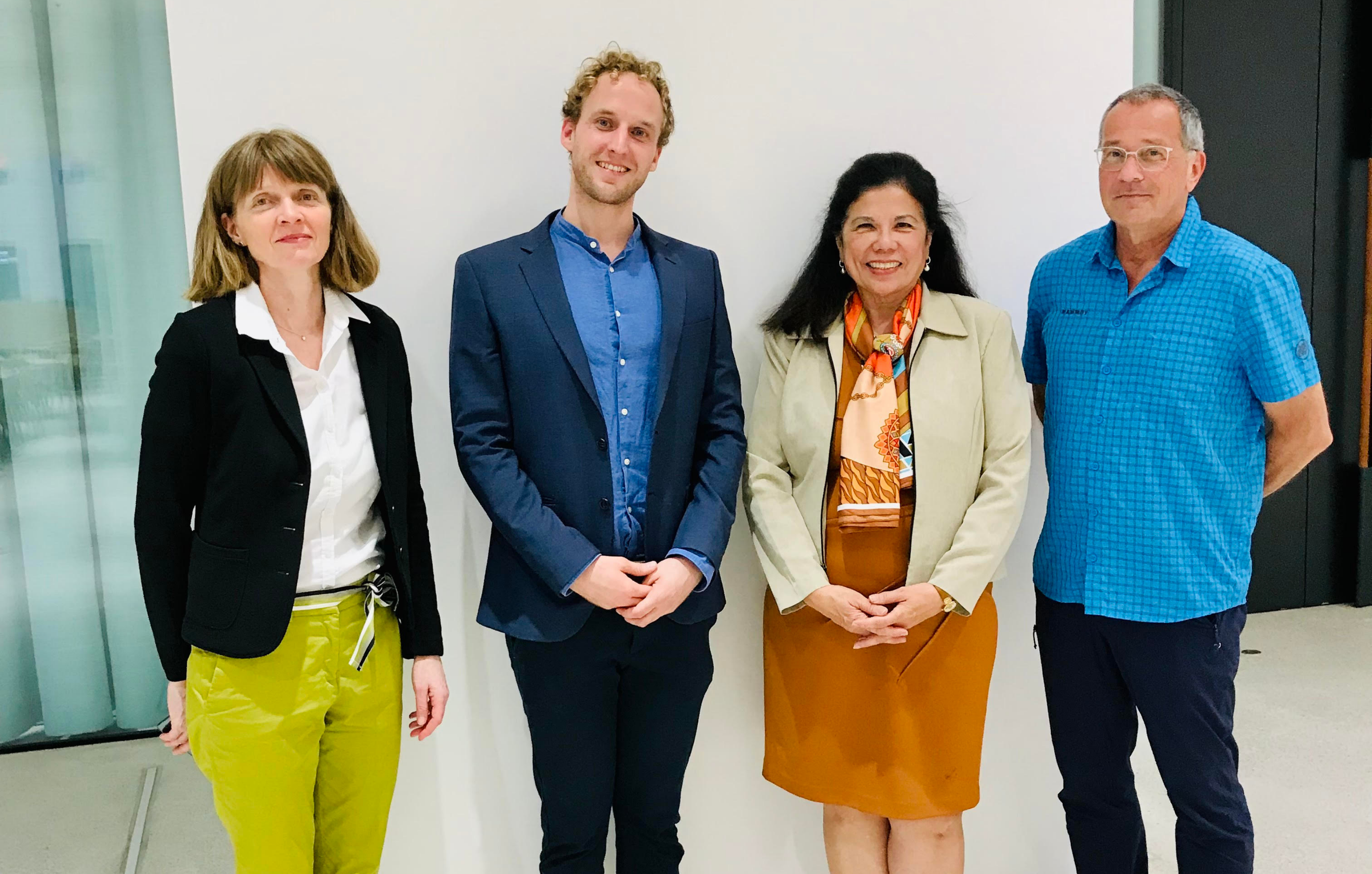May 24th 2022
Takeaways from Panel Discussion: Impact of COVID-19 on Global Paediatric Health
On May 24th 2022, a panel of experts highlighted several important facets of the consequences that COVID-19 pandemic has on the global paediatric health situation:
- decreased access to vital child healthcare services like newborn care and immunisation
- increased poverty
- more nutritional and physical activity deprivation
- mental impairment
- compromised learning and loss of a caregiver
Moderator: Prof Julia Dratva, Zurich University of Applied Sciences (ZHAW) & University of Basel, Switzerland
Panel members: Prof Yvonne Maldonado, Stanford University, USA; Prof Alan Stein, University of Oxford, UK; Dr Marc Birkhölzer, University of Basel, Switzerland; Prof Thomas Berger, Secretary and Chief Medical Advisor at NEO FOR NAMIBIA
More about the event here.
Find out more about our speakers and read about their takeaways below

From left to right: Prof Julia Dratva, Dr Marc Birkhölzer, Prof Yvonne Maldonado, Prof Thomas Berger. (Prof Alan Stein joined remotely, not pictured)

Prof Yvonne Maldonado
Prof Yvonne Maldonado
Division of Infectious Diseases, Department of Pediatrics
Department of Epidemiology and Population Health Stanford University School of Medicine, USA
Yvonne Maldonado is Professor of paediatrics, epidemiology, and population health, and Chief of the division of paediatric infectious diseases at the School of Medicine, Stanford University. She also currently serves as Stanford Medicine’s Senior Associate Dean of Faculty Development and Diversity. Prof Maldonado's research focuses on the epidemiology and prevention of viral infectious diseases such as paediatric HIV, polio, measles and Ebola. Her work on mother-to-child transmission of HIV in sub-Saharan Africa is credited for preventing hundreds of thousands of newborns from acquiring HIV. She also leads research on the development and implementation of vaccines in low- and middle-income countries.
Visual: Stanford University
Children have lost basic medical care, learning and developmental stimulation. The toxic stress generated during the pandemic might have lifelong consequences and even epigenetic effects which can be transmitted to future generations. Health and educational disparities between different communities came to light and widened during the COVID-19 pandemic. Additionally, medical attention, such as vital immunizations, might never be fully recuperated for children born between 2019-2020. There is a need to consider the benefit of vaccines as an economic measure. We need to address how to build an economic model for the short-, middle- and long-term benefits of vaccine programs, including their use as platforms for additional well child care, to influence policymaking.

Dr Marc Birkhölzer
Dr Marc Birkhölzer
Psychiatrist, University of Basel, Swizterland
Dr Marc Birkhölzer is currently a senior physician at the Juvenile Forensic Department of the Psychiatric University Clinics of Basel (UPK). His research focuses on personality disorders. Over the years, he has built an extraordinary network of collaborators in countries all over the world.
The COVID-19 pandemic amplified the difficulties in many children’s lives causing a derailment for the most vulnerable. Mental health became a real concern as many young people lost their routine, support structure and medical assistance. The COVID-19 pandemic highlighted the need for increased awareness of mental health development for children and adolescents. To this day, there is a waiting list of 3-6 months for children and adolescents to receive mental health support in Switzerland, creating a continuous strain on mental health professionals. This comes as a result of the increased number of individuals requiring mental health support and the sense of urgency.

Prof Alan Stein
Prof Alan Stein
Department of Psychiatry, University of Oxford, UK
Alan Stein is Professor of Child & Adolescent Psychiatry at the University of Oxford, Honorary Professor in the School of Public health at the University of Witwatersrand and a member of the faculty of the African Health Research Institute, South Africa. His main area of research concerns the development of children and adolescents in the face of adversity. Ultimately the priority is to develop interventions. He has led three Lancet series on: i) The mental health of internally displaced and refugee children, ii) Perinatal mental health, iii) The communication of life-threatening conditions to children.
Over 1.5 million children have lost at least one caregiver due to the COVID-19 pandemic, suffering the consequences of this loss and subsequent isolation. Very little support is available from governmental structures to support both children and caregivers in a time of crisis such as the COVID-19 pandemic. Children in low-income families find themselves in precarious situations including nutritional deprivation, compromised learning and in some cases, extreme poverty. As a result, these children are at increased risk of suffering from long-lasting secondary health and social impacts. It is now crucial to reflect on how to create integrated health systems to strengthen health delivery and how to enhance communication.

Prof Thomas Berger
Prof Thomas Berger
Secretary and Chief Medical Advisor at NEO FOR NAMIBIA - Helping Babies Survive
Prof Thomas Berger is a paediatrician specialised in neonatology and intensive care. With more than 25 years of experience in neonatology in various high-income countries, he decided to share his knowledge with physicians and nurses in less privileged countries. Therefore, he and his wife founded the non-profit organisation NEO FOR NAMIBIA – Helping Babies Survive in 2017. The team has just launched their 14th mission in Rundu State Hospital to improve neonatal and paediatric care in Namibia.
Worldwide, neonates were only rarely affected directly by COVID-19. However, they continued to die from complications of prematurity, birth asphyxia and early- and late-onset bacterial sepsis during the pandemic. Corona-related preventive measures put significant strain on labile health care systems in low- and middle-income countries (LMICs), and, consequently, collateral damage to neonates undoubtedly occurred but remained largely unmeasured. Moreover, it was clear that measures designed for high-income countries (HICs) were frequently not appropriate for LMICs. Finally, only little research is done in LMICs; this needs to be changed if we want to solve their challenges and improve their ability to cope with future pandemics.

Prof Julia Dratva
Prof Julia Dratva
Institute of Public Health, ZHAW Zurich University of Applied Sciences, Switzerland
Medical Faculty, University of Basel, Switzerland
Prof Julia Dratva is a public health expert with a focus on child and adolescent health and early life factors of health and disease. She is the Head of the Public Health Research Unit at the Zurich University of Applied Sciences (ZHAW) and an Assistant Professor in the Medical Faculty at the University of Basel.
Prof Dratva is a medical doctor by training with a background in internal medicine. She also holds a Master degree in Public Health and a Specialist Certification (FMH) for "Prevention and Public Health". She has a particular interest in the life course approach to health and disease in research and teaching, addressing vulnerable groups and vulnerable time spans. She also has research interests in cardiovascular health, health monitoring, health literacy and digital health.
While globally the focus lay on COVID-19 containment, the pandemic accentuated health disparities in children and adolescents across the globe. Already existing lack of basic health infrastructure (e.g. perinatal care) or indicated interventions (e.g. mental health, vaccination) worsened with a potential long-term impact on child health.
Crisis preparedness means ensuring functioning pediatric health care systems and addressing child- and adolescent-specific health needs at any times